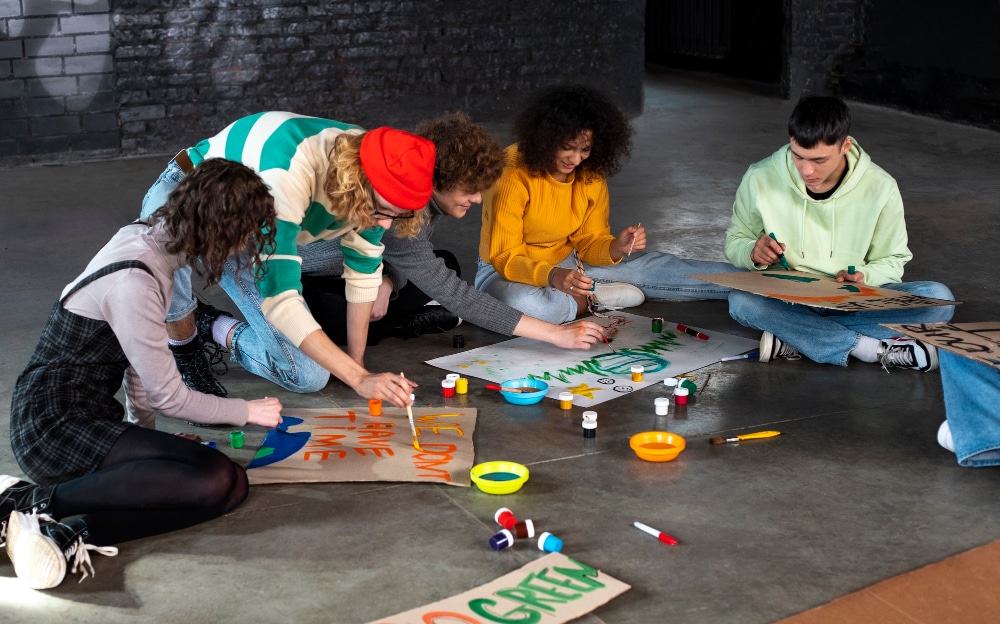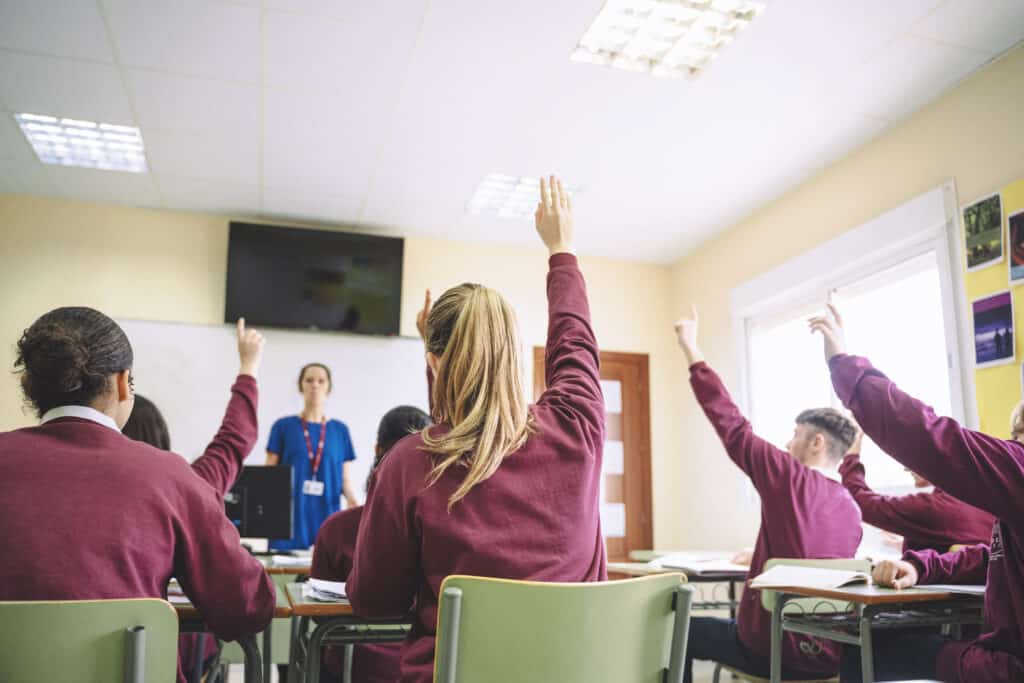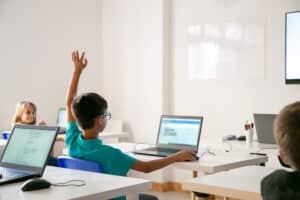At The Benalmadena International College, our mission is to provide a cutting-edge education that prepares our students not only for academic challenges, but also for the complexities and opportunities of the real world. In this journey, “Active Learning” emerges as the cornerstone of our pedagogical philosophy, an approach that goes beyond the mere transmission of knowledge to encourage the comprehensive developent of each student. We understand that, as parents, you want the best for your children, and that is why we want to share with you in depth what active learning means, how we implement it at BIC, and why it is fundamental to your children’s success in the 21st cent
Concept and meaning of active learning: The leading role of our students
Active learning is an educational methodology that promotes the active and conscious participation of students in their own learning process. Far from traditional models where the student is a passive recipient of information, this approach seeks to get our young people to interact, collaborate, investigate and, ultimately, construct their own knowledge. At The Benalmadena International College, we firmly believe that when a student becomes the protagonist of their own learning, understanding is deeper, retention is longer lasting and intrinsic motivation increases exponentially.
This pedagogical model is part of an educational approach that prioritises the commitment and active participation of students in their learning process. It is intentionally designed so that each student, from the youngest to those preparing for university, feels empowered and responsible for their educational journety. It is not just about learning what to think, but about learning how to think, how to question and how to apply what they learn in diverse situations.
History and evolution: A change in the educational paradigm
The history of education has been a journey of constant evolution. In its early days, teaching was predominantly focused on the one-way transmission of knowledge by the teacher.
However, as learning theories evolved, especially influenced by constructivist trends at the end of the 20th century, the effectiveness of such a restrictive model began to be questioned. Thinkers such as Jean Piaget and Lev Vygotsky showed us that individuals construct their knowledge through interaction with their environment and with others.
It was in this context that active learning began to gain popularity. This approach is based on the powerful idea that students construct their knowledge more effectively when they actively participate in the educational process, rather than being mere passive recipients of information. At The Benalmadena International College, we have embraced this evolution, recognising that education must adapt to the needs of an ever-changing society, preparing students for a future that demands adaptability, creativity and critical thinking.
Fundamental differences from passive learning: A crucial contrast
To fully understand the value of active learning, it is essential to contrast it with passive learning. The differences are obvious and have a direct impact on the quality of learning and the development of our learners.
- Active approach: Interaction and participation are key. At The Benalmadena International College, interaction and participation are at the heart of every school day. This model promotes collaboration, constructive debate, group problem solving and practical experimentation. The result is more meaningful, deeper and, crucially, longer lasting learning. Our students don’t just memorise facts, they understand concepts, apply them and internalise them through experience.
- Passive mode: One-way flow and low motivation. In contrast, passive learning is characterised by a one-way flow of information from teacher to learner. This, unfortunately, often leads to superficial understanding, limited retention of information and, more worryingly, low motivation and apathy in learning. Students simply listen to lectures, reading textbooks and doing exercises without a deep connection to the content, which can stifle their innate curiosity.
The fundamental difference, therefore, lies in how students engage in learning and how this engagement directly impacts their understanding, retention and ultimately their love of knowledge. At BIC, we strive to ignite that spark of curiosity and keep it alive.

Relevance in modern education: Preparing our children for tomorrow
In today’s educational context, where the world is evolving at breakneck speed, active learning methodology takes on unparalleled relevance. It is not enough for our students to acquire information; it is vital that they develop skills that enable them to adapt, innovate and succeed in real-life situations and in a constantly changing labour market.
The application of this approach in the classrooms of The Benalmadena International College offers multiple tangible benefits for your children’s future:
- Preparation for real-world situations: Our students are trained to apply their knowledge to specific problems, developing their analytical skills, ingenuity and conflict resolution abilities. Through authentic projects and challenges, we simulate real-world scenarios, equipping them with the necessary tools necessary to navigate complexity.
- Promotion of essential social skills: The constant interaction between students in collaborative projects enables the development of crucial competencies such as effective communication, negotiation, leadership and teamwork. These are interpersonal skills that transcend the classroom and are indispensable in any area of life.
- Increased motivation and engagement: Being able to actively participate in the educational process increases students’ intrinsic commitment. When they feel listened to, valued and an active part of their learning, their motivation soars, resulting in deeper, more meaningful and, without a doubt, much more interesting learning.
Active learning methods and strategies at The Benalmadena International College
At BIC, we implement a wide range of methodologies and strategies that encourage the active participation of our students. These are not mere techniques, but pillars that promote the development of fundamental skills and enable our students to become active agents and responsible for their own education.
Problem Based Learning (PBL): Authentic challenges, innovative solutions
This method involves students facing authentic and complex problems that they must solveusing their prior knowledge and research skills. Through PBL, our students learn to applywhat they have studied to real-world situations, thus developing their analytical, reasoningand creative problem-solving skills. This approach not only enhances theoretical learning,but also prepares students to face practical challenges with confidence and competence.
Collaborative learning and group dynamics: The strenght of the team
Collaborative learning is a fundamental pillar at The Benalmadena International College. It focuses on teamwork, where students learn and develop knowledge in groups. This encourages effective communication, the exchange of ideas, respect for different perspectives and the collective construction of knowledge. This type of learning is not only beneficial for the understanding of content, but also promotes valuable interpersonal skills that are crucial in any professional or social environment.
Group dynamics are used to build team cohesion and improve communication between members. These exercises can take many forms, from role-plays and simulations to structured discussions and team-building activities. They help students develop their ability to work together, resolve conflicts constructively and make decisions together – skills that are transferable to all areas of their lives.
Collaborative projects and project-based learning (PBL): Practical application and creativity
Collaborative projects allow our students to tackle a specific topic or problem in a group. Through research, design, planning and presentation of a final project, students apply their knowledge in a practical and creative environment. This strategy enhances creativity, critical thinking and synthesis skills, while fostering a deep sense of community and shared responsibility among participants.
Project Based Learning (PBL) goes one step further, combining multiple disciplines and allowing students to explore topics in depth through a concrete, long-term project. This approach enhances the relevance of learning, as students see the intrinsic connection between different areas of knowledge and their direct application in the real world. Skills such as time management, organisation, strategic planning and self-assessment are developed and refined throughout this process, preparing our students for the complexity of future projects.
Experiential learning: Connecting theory with reality
This methodology focuses on learning through direct experience and deep reflection on that experience. At The Benalmadena International College, our students participate in activities that allow them to explore concepts in a practical way, facilitating deeper, more meaningful and memorable learning.
- Practical Activities: These include experiments in state-of-the-art laboratories, interactive simulations, design and robotics workshops, and field activities that allow students to apply theoretical concepts in a tangible way. These activities are fundamental to reinforce learning by connecting theory with practice, which facilitates a more solid understanding of the content.
- Field Visits: These offer students the opportunity to learn in real-life contexts. Whether field trips to museums, local businesses, cultural institutions or natural environments, these experiences enrich learning and allow students to observe and participate in authentic situations that complement and bring to life the theory covered in class.
Discovery learning: Encouraging curiosity and autonomy
In this approach, students’ innate curiosity and autonomous exploration are encouraged. They are encouraged to discover concepts on their ownby themselves through questioning, experimenting and active information seeking, experiments and the active search for information, promoting active, reflective and self-directed learning:
- Role of the Teacher as Guide: In discovery learning, the teacher at The Benalmadena International College acts as an expert guide who directs students, asking stimulating questions that provoke critical thinking and investigation. The intention is for students to draw conclusions from their own investigation and exploration, which strengthens their intellectual autonomy and reasoning skills.
- Learner Autonomy: Fostering autonomy in learning is essential for the development of proactive and responsible individuals. By empowering students to design their own discovery process, they are given the invaluable opportunity to make decisions, manage their time and be responsible for their own learning, which significantly increases their motivation and engagement in learning.
Benefits of Active Learning: A Transformative Impact on our Children’s Development
The implementation of active learning methodologies at The Benalmadena International College brings a variety of significant advantages in the academic, personal and professional development of our students. These advantages are reflected in a positive change in classroom dynamics, enhancing the educational experience in multiple ways.
Developing essential skills for the 21st century
Active learning focuses on stimulating the development of skills that are crucial for modern and professional life. Our students not only acquire theoretical knowledge, but also exercise and refine it:
- Problem Solving: Fostering critical analysis, creativity and resilience in complex and ambiguous situations.
- Effective Collaboration: Learning to work in teams, to negotiate, to delegate and to achieve common objectives, indispensable skills in any work environment.
- Communication: Improving your ability to express ideas and arguments clearly, concisely and persuasively, both orally and in writing.
- Creativity and Innovation:C By seeking innovative and original solutions to the challenges that arise, encouraging “outside” thinking.
These skills are highly valued in today’s labour market and contribute to the formation ofindividuals prepared to face the challenges of the 21st century with confidence and success.

Fostering critical and analytical thinking
Active methodologies invite students to question, analyse, evaluate and reflect on information rather than simply accepting it at face value. This approach promotes an intellectually stimulating environment that develops critical thinking, enabling our students to:
- Identify and Evaluate Arguments: Distinguish between fact and opinion, recognise bias and evaluate the validity of information.
- Formulate Relevant Questions: Promoting a deeper understanding of issues and the ability to research autonomously.
- Make Informed Decisions: Based on evidence, rigorous analysis and logical reasoning.
This mental exercise not only enriches their academic learning, but also prepares them to make informed and responsible decisions in their daily and future lives.
Student Motivation and commitment: The Joy of Learning
Active learning methods generate a noticeable increase in students’ intrinsic motivation. By actively participating in their education, our students feel more engaged, more responsible and more in charge of their learning process. Factors that contribute to this motivation include:
- Personalisation of Learning: Where they can tailor their approach according to their individual interests, learning styles and paces.
- Sense of Achievement: Experienced by overcoming challenges, solving problems and working successfully in a team, building strong academic self-esteem.
- Continuous Positive Feedback: which reinforces their confidence in their abilities and guides them in their constant improvement.
This increase in motivation not only improves academic performance, but also promotes a positive attitude towards lifelong learning, an invaluable quality in an ever-changing world.
Preparation for the real and professional world
One of the most outstanding advantages of active learning is its ability to prepare students for the working environment and real-world challenges. This educational approach allows our students to:
- Develop Practical Skills: which they can apply directly in real situations, bridging the gap between theory and practice.
- Learn to Work in Collaborative and Diverse Environments: Simulating the dynamics of the labour market, where interaction and cooperation are key.
- Acquire Relevant Experiences: That facilitate them to make the transition from education to work with greater confidence, adaptability and a portfolio of demonstrable skills.
Activities focused on real-world problems, collaborative projects and hands-on experiences deeply enrich their education and equip them with a set of tools necessary for professional success in whatever field they choose.
Examples of active learning in The Benalmadena International College classroom
The implementation of active learning in BIC classrooms is varied, dynamic and adaptive, fostering an environment that encourages participation and discovery. Below are concrete examples of how we integrate this methodology into your child’s daily education.
Using Technology and Online Platforms: Tools for Collaboration
Technology has become an essential ally in active learning at The Benalmadena International College. Our online platforms and digital resources offer tools that encourage collaboration, the exchange of ideas and autonomous research among students:
- Virtual Classrooms and Discussion Forums: Students can work on joint projects,share their findings, debate ideas and give feedback in real time, extending learning beyond the physical boundaries of the classroom.
- Project Management Applications: Help students organise their tasks, coordinate efforts and manage deadlines, promoting accountability, self-direction and the development of project management skills from an early age.
- Interactive Resources and Simulations: Allow students to explore complex concepts in a visual and practical way, facilitating understanding and safe experimentation.
Integration of educational projects: Learning with purpose
Educational projects are an effective and cross-disciplinary way of applying active learning at BIC. This approach allows students to explore topics of interest, investigate in depth and generate creative solutions to real problems. Problem creation can spam across disciplines, enriching the educational process and promoting interdisciplinarity:
- Projects with Local Impact: Students can work on projects that address challenges in our local community, promoting their civic engagement and strengthening their connection to the environment and society.
- Interdisciplinary Projects: In the classroom, we implement projects where students integrate knowledge from different areas (science, humanities, art, technology) to approach an issue from multiple perspectives, reflecting the complexity of the real world.
Inclusion of work and community experiences: Connecting the school to the world
Work and community experiences are fundamental to meaningful and contextualized learning. They allow students to apply what they learn in a real-world context, facilitating a direct connection between theory and practice.
- Work Placements and Company Visits: The Benalmadena International College establishes agreements with companies and institutions for students to undertake work placements or visits, giving them a direct insight into their future profession and the workings of the world of work.
- Volunteering and Community Service Projects: The inclusion of volunteering projects allows students to contribute to social causes, developing interpersonal skills, a sense of community responsibility and empathy.
Artistic and creative activities: Expression and divergent thinking.
Artistic activities are an excellent way to encourage active learning and self-expression. Through creative expression, students can explore concepts in innovative ways and develop their divergent thinking. The integration of arts disciplines into the BIC curriculum offers our students new ways to think, collaborate and communicate:
Exhibitions and Performances: Art exhibitions, concerts or theatre performances in which students present their work not only reinforce learning and discipline, but also strengthen self-confidence, presentation skills and critical thinking.
Thematic Arts Projects: Drama, music, dance or visual arts can be used to address relevant curriculum themes, promoting reflection, debate and emotional understanding among students.

Challenges and Considerations for Implementing active learning: Our institutional commitment
Effective implementation of active learning, while hugely beneficial, can face a number of challenges and requires specific considerations on the part of educators and institutions. At The Benalmadena International College, we are fully aware of these challenges and have made an institutional commitment to overcome them.
Logistical and resource challenges: Creating optimal environments
Implementing active methodologies often involves a number of logistical barriers. At BIC, we have invested and continue to invest in:
- Adequate Facilities: We have flexible classrooms, collaborative spaces, equipped laboratories and outdoor areas that facilitate group work, experimentation and movement.
- Didactic and Technological Resources: We ensure the availability of innovative didactic resources and cutting-edge technology to enable practical activities, group dynamics and complex projects.
- Time Management: We recognise that these methodologies require detailed planning and sometimes more time to implement. Our schedules and curricula are designed to allow for the depth and exploration that active learning demands.
Meeting these challenges is an ongoing commitment of The Benalmadena International College to ensure that our educators are equipped to implement these effective approaches in the classroom.
Teacher Training and Adaptation: Teaching Excellence
A critical aspect of implementing active learning is the preparation and ongoing professional development of our teaching staff. At BIC, we understand that without adequate training, teachers may be hesitant to adopt these new methodologies. Therefore, the following points are essential to our approach:
- Continuous Teacher Training: Our educators receive ongoing training that provides them with the tools and skills necessary to facilitate active learning. This includes knowledge of different pedagogical strategies, their practical application in the classroom and the use of new technologies.
- Practical and Experiential Workshops: We organise workshops where teachers experience active learning first-hand, allowing them to understand it from the student’s perspective and apply it more effectively.
- Access to Resources and Materials: We provide constant access to resources, innovative teaching materials and support networks to help them plan effective lessons and solve pedagogical challenges.
Training is a continuous process that adapts to the changing needs of students and the global educational environment.
Managing change and raising awareness in the educational community
Transmitting a new educational philosophy can be a challenge, but at The Benalmadena International College, we approach it with a comprehensive change management strategy. This involves not only preparing our teaching staff, but also making the whole educational community – pupils, parents and administrative staff – aware of the benefits and importance of active learning:
- Clear and Effective Communication: We maintain transparent and constant communication about our pedagogical approach and its advantages through meetings, newsletters and our online platform.
- Engaging Educators: Our teachers are actively involved in the process of designing and implementing these strategies, which fosters their sense of ownership and commitment.
- Encouraging Innovation: We create an environment that fosters innovation, experimentation and creativity among the entire teaching team, celebrating successes and learning from challenges.
Engaging students and families: A critical alliance.
The collaboration and commitment of students and their families are essential to the success of active learning. At The Benalmadena International College, we strive to foster an environment where students are motivated to participate and take an active role in their education, and where families are active partners in this process.
- Student Inclusion in Design: We include students in the design of activities and projects, giving them a voice and a vote in their learning process, which increases their sense of ownership and responsibility.
- Information and Support for Families: We inform families about the active
learning approach, its benefits and how they can support this process at home,
creating a coherent learning ecosystem.
- Feedback Mechanisms: We develop feedback mechanisms where students and families can express their opinions and suggestions on the methodologies used, allowing us to adapt and continuously improve.
An involved and cohesive educational community strengthens the commitment of all participants, providing solid support for active learning and the integral development of each student.
The role of the teacher in active learning: Guides and facilitators of the future
At The Benalmadena International College, the teacher plays a crucial role in the implementation of active learning, acting as a guide, mentor and facilitator throughout the educational process. Their focus is on creating a space where students can fully participate, explore their interests and develop their skills to the fullest.
Facilitator and guide of the educational process: Beyond transmission
In this new dynamic, the BIC teacher becomes a facilitator of learning, helping students to explore, inquire, question and actively participate in their own educational process. The role of the educator shifts from the simple transmission of knowledge to a more participatory, supportive and accompanying role. This involves several key responsibilities:
- Design Stimulating Activities: Encourage students’ active participation, curiosity and critical thinking.
- Guiding Question Formulation: Help students formulate relevant questions and identify meaningful problems for investigation.
- Provide Resources and Tools: To stimulate autonomous learning and exploration, acting as curators of information and opportunities.
- Offer Assistance and Guidance: Being available to offer individualised and group support as students interact with the material and with each other, thus breaking down traditional barriers between educator and learner.
Fostering a safe and participatory environment: A space of trust
Creating a safe, welcoming and trusting environment is essential for students to feel comfortable participating, experimenting and sometimes making mistakes as part of the learning process. Our educators at BIC strive to establish a climate where each student feels valued, respected and free to express themselves. To achieve this, the following are taken into account:
- Promote Inclusive Participation: Through group activities that encourage togetherness, collaboration and valuing diversity of ideas.
- Establish Clear Rules: Rules that regulate behaviour and communication, ensuring that everyone has the opportunity to be heard and that mutual respect is the basis for interaction.
- Be Responsive to Ideas and Concerns: Adapting teaching strategies according to students’ needs and interests, demonstrating flexibility and empathy.
This approach not only helps students feel more engaged and motivated, but also promotes a culture of peer learning, where they learn from and with their peers, benefiting all participants.
Continuous and holistic assessment: Measuring overall progress
Assessment in an active learning environment at The Benalmadena International College must be continuous, formative and holistic, focusing on both the learning process and the end product. This requires a change in the way teachers have traditionally been trained to assess their students, moving from summative assesment to a more comprehensive and development – orientated approach.
Constant and constructive feedback
Feedback is a powerful tool in active learning. Our teachers provide regular feedback that informs students about their progress, helps them identify areas for improvement and guides them on their learning journey. Feedback can take various forms:
- Verbal Feedback: During classroom activities, offering immediate and personalised guidance.
- Peer Evaluation: Encouraging collaboration, critical thinking and learning among students, where they learn to give and receive constructive criticism.
- Detailed Reports: Highlighting both strengths and areas for development, providing a clear picture of progress.
- Learning Portfolios: where students collect and reflect on their work over time, demonstrating their growth.

Diversity in assessment techniques: A holistic approach.
The use of diverse methodologies in assessment allows a broader spectrum of students’ abilities, skills and achievements to be captured. This diversity includes:
- Formative Assessments: which focus on the learning process, identifying support needs and adjusting teaching in real time, rather than just on final outcomes.
- Detailed Rubrics: which allow for the assessment of group work, projects, presentations and other complex activities, promoting skills such as cooperation, communication, creativity and critical thinking.
- Self-Assessment and Reflection Methods: which encourage students to become aware of their own learning process, to identify their strengths and weaknesses, and to set goals for improvement.
- Direct observation: by the teacher to assess participation, interaction and application of skills in different contexts.
This comprehensive approach to assessment provides teachers at The Benalmadena International College a more complete picture of each student’s learning, promoting continuous and adaptive development for both students and the education system as a whole.
Conclusion: A Partnership for Our Children’s Future
At The Benalmadena International College, active learning is not just a methodology; it is a philosophy that permeates every aspect of our institution. We are convinced that by empowering our students to be the architects of their own knowledge, we are providing them with the essential tools to thrive in an ever-changing world.
We firmly believe that this educational approach, focused on engagement, collaboration, critical thinking and practical application, is the best preparation for the challenges and opportunities of the 21st century. It is a commitment to academic excellence and, more importantly, to the development of individuals who are whole, curious, resilient and capable of making a positive difference in the world.
Bibliographic references
- 13 Active Learning Strategies for Online Classes
- Active Learning Statistics: Benefits for Education & Training in 2025
- Active Learning | Vanderbilt University


